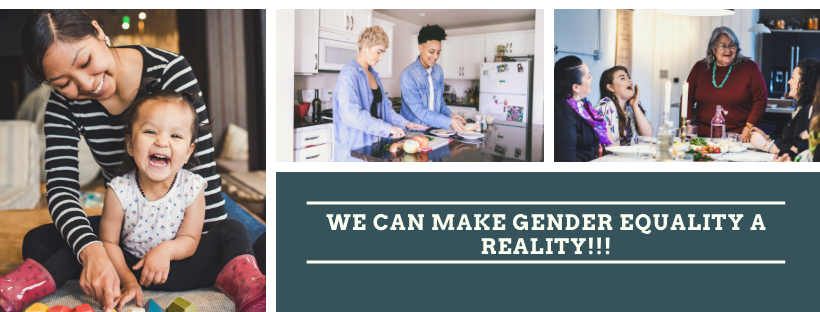I feel a mix of emotions every time International Women’s day comes up.
Part of me is thankful. Thankful to the women who paved the way for me to enjoy the privileges and rights I have today. Thankful to those who continue to fight the fight now. It’s not perfect living where I do now but the relief of worrying less about my safety and security is noticeable. I’m also better able to live the life I want to live and do the work I do in spite of discrimination based on my skin colour, where my family is from, my perceived age and my gender.
To all who have fought so that I may experience this, I promise you, I do not take it for granted.
So, I’m thankful but what I’ve described isn’t gender equality is it?
We still live in a world where women still fight to be heard, to be taken seriously and to actually feel safe and confident that their human rights will be backed up when challenged. We still live in a world where women are perceived as a glob – that somehow we’re all the same – instead of individuals who identify in many ways including in terms of gender identity and sexual orientation. We still live in a world where men are socialized into gender norms that breed toxic masculinity and we still live in a world unable to fully recognize the needs, wants and rights of those who don’t identify in binary terms. None of us experience gender equality or equity. All are impacted negatively by the patriarchy.
So how can we make gender equality a reality? Here are a few actions we can take to create gender equality, equity and peace.
Listen. Take the time to listen. In the coming days you will hear stories of courage, grief, struggle and resilience. You will also hear what women from different walks of life want. Resist the urge, if you have it, to think: “Oh, but I know a better way.” or “That’s not really the problem. It’s (fill in the blank) and this is the way to solve it!” It’s understandable to presume people have similar experiences because we can get caught-up in our own thoughts but it’s not acceptable. Our lives are different. Take the time to digest the words, experience and emotions shared over the coming days. This is more than just one day of acknowledgment.
Practice Curiosity. As you listen keep in mind the following questions: What is something new I can learn from this?, Why is this of interest to others? and What new insights can I have by taking in this narrative through another perspective? Especially if you feel a strong reaction to what you hear, pause and get curious. Take the time to keep learning because it’s from a curious mind that we get the innovative solutions to the problems we face today.
Be an Ally. Being an ally doesn’t just mean showing up and lending a hand. It’s about asking a very important question: How can I help? Now this question can be tricky. It’s tempting to ask this of someone experiencing discrimination, harassment and worse. It makes sense. I mean, if you don’t ask, how will you know what their needs are? That said, I urge you to answer it by doing some homework first. Learn how you can help by researching, reading reports and recommendations from impacted groups and listening to first-hand accounts. Why? Consider another perspective: If that person has struggled to exercise their human rights and has fought hard to achieve them, through discriminatory situations they didn’t even create, sometimes the last thing they want is for someone with greater privilege asking for help figuring it all out. So be mindful. How can I help? is a powerful question. It can make the person whose experienced discrimination feel a sense of relief to know they are not alone. That said, to avoid people feeling like they have to take on the additional load of educating you, demonstrate that you have done your homework. Share with them that you are taking actions to understand their needs and that you’d like further clarification. How much more meaningful is that gesture? Imagine a true ally saying, “Here’s what I’ve learned I need to do, what else can I do to support you?”
Pass the relay baton. Talking with my best friend on her podcast, I spoke of how important it is, as someone advocating for your human rights, to “pass the baton” to someone else, like you would in a relay. As important as it is for allies to step-up and offer help, you need to accept it to maintain your resilience. Passing the baton therefore, means letting go when you need time for self-care and accepting help. If you burn-out, we lose an important person in the effort to achieve gender equality, equity and peace. I’m talkin’ about YOU my friend!
Acknowledge to be heard. Trying to achieve gender equality and equity means you are disrupting an existing system. Change is upsetting. As people voice their fears, concerns, hopes and dreams indicate, through your words, that you’ve really heard them. Use the words they’ve used and be genuine. If not, your attempt to acknowledge them may feel hollow. As you try to get folks to consider your perspective, refrain from words that are dismissive like: but, however, nevertheless etc. Taking these steps will create the space you need to self-advocate and be heard. Model how you want to be treated in return.
Honour Your Feelings. Take the time to be with your emotions: Resentment, hurt, pride, happiness, relief etc. These emotions are part of our brain’s response to our interactions with others, our past experiences and to what we intake (like media, reports etc.). In stifling emotions, you shut down your ability to use your full system to self-regulate. You also open yourself up to burn-out. Remember, release emotions in a space you feel free from judgement and shame and one that feels safe and secure.
Practice Kindness. It’s easy to slip down the rabbit hole of despair if you think of how much work is still left to do. Your actions are an antidote because they have the power to change the way you feel. You can give yourself an energy-boost by practicing kindness with yourself first so that you can practice kindness with others. Consider these questions: What is one kind thing I can do for me and what is one kind thing I can do for another human being?
Now I don’t know if you noticed this but in suggesting you take the above actions, I’m promoting the use of conflict resolution and resilience skills in order to fulfill my vision for people to live peacefully. 🙂 I know that practicing new skills will feel uncomfortable so think of it like going through a growth spurt! Yes it’s uncomfortable and kinda annoying AND it indicates growth!
Let’s really celebrate International Women’s Day by making a commitment here and now to practice one of these skills! Let it also be a way of honouring your awesome self! Remember, take baby steps. Don’t, for example, try one or all of the steps you may have never tried at an international conference. Instead, try one step, with one person. Take one small, calculated risk so that you can continue to feel empowered to make a difference.

P.S. Free Webinar: Register for my free webinar: How to Manage Conflict and Emotions in Anti-Racism Work.
For those who show up live the last 10 to 15 minutes will not be recorded to create a safe space for Q&As.For those who can’t make, a replay will be sent after.
P.P.S. Team Training: Is your team ready to build their skills and capacity to engage in difficult, meaningful conversations? If so, let’s talk. Book an info chat with me here. Review my full suite of services here.

